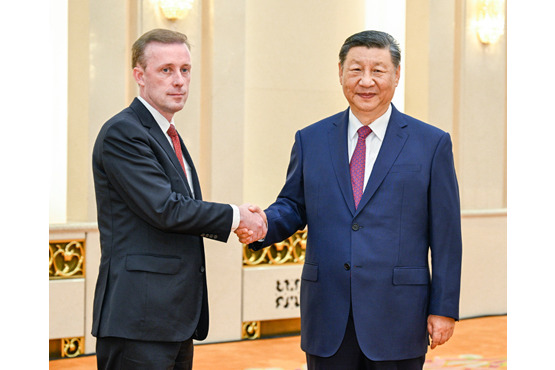China Telecom at forefront of AI and cloud technology


Innovative technologies from State-owned enterprises such as China Telecom showcase the country's strength in strategic sectors, including artificial intelligence and cloud computing, and will help inject new vitality into economic growth, experts said.
The comments came after China Telecom, a major telecom carrier in China, debuted a string of cutting-edge products and services at the 7th Digital China Summit in Fuzhou, Fujian province, last week.
Gou Ping, vice-chairman of the State-owned Assets Supervision and Administration Commission of the State Council, the country's Cabinet, said SOEs have been boosting their influence in terms of computing power, data and algorithms, which effectively support the development of the digital economy and the construction of a digital China.
The combined cloud business revenue of China's big three telecom carriers — namely China Telecom, China Mobile and China Unicom — exceeded 230 billion yuan ($31.7 billion) in 2023, with their size and growth far surpassing the industry average, making it a new engine for enterprise growth, Gou said.
Ke Ruiwen, chairman of China Telecom, said the company is committed to pushing forward ongoing technological innovation, thus leveraging its integrated digital infrastructure.
Ke said the advancement of cloud computing and AI models is a collaborative effort with partners across the industry, focusing on cutting-edge technologies and open cooperation.
China Telecom's cloud computing business, whose official English name was changed to "State Cloud", has crossed a threshold in its drive toward intelligent cloud development and is now in a new stage of development, Ke said.
So far, SASAC has promoted 36 centrally owned enterprises to build cloud computing platforms across 40 industries. China Telecom's cloud computing infrastructure supports 24 out of the 40 industry platforms.
At the 7th Digital China Summit, China Telecom also showcased its technological muscle in AI. TeleAI, the AI research division of China Telecom, has unveiled the industry's first advanced speech recognition model capable of understanding and processing over 30 Chinese dialects.
This large language model, Xingchen, addresses a significant barrier in customer service, where millions of daily calls, especially from elderly users in remote regions, are made in local dialects that traditional AI systems and customer service representatives struggle to comprehend.
With approximately 20 percent of China's population not fluent in Mandarin Chinese, this advancement aims to bridge the communication gap, ensuring equitable access to digital services for all, China Telecom said.
Xiang Ligang, director-general of the Information Consumption Alliance, a telecom industry association, said China Telecom boasts a fast internet network and a huge amount of data resources, which give it an advantage in developing artificial intelligence and cloud computing.




































